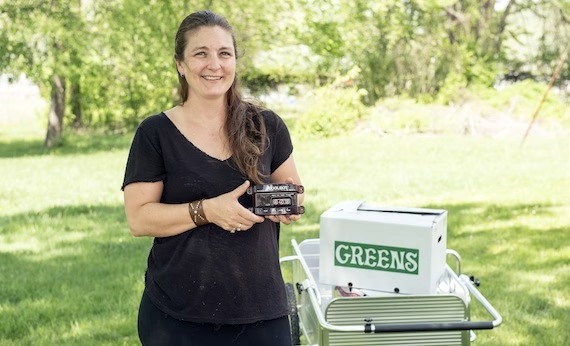Contact: Kimberly Osborne (304) 766-3363 kosborne@wvstateu.edu INSTITUTE, W.Va. – A new initiative by West Virginia State University (WVSU) Extension Service seeks to create longer-lasting fruits and vegetables by providing the state’s small farmers with education and resources regarding cold chain technology.
Cold chain technology refers to the proper refrigeration and storage of crops during the time between harvest by the farmer and end purchase by the consumer to help ensure peak freshness. The need to prolong crop life from farm to table has become more visible as the local foods movement has gained momentum in West Virginia and nationwide.
“The local foods movement is being embraced all over, which is great,” said WVSU Extension Agent Robin Turner. “But we have learned that many small-scale farmers lack the resources necessary to maximize the life of the crops they’re growing. The old adage that one bad apple destroys the bunch, for instance, is true, and that surprises some people.”
WVSU is providing instruction to 20 farms during the pilot phase of the project, using a series of four workshops. Participants are learning about all aspects of care before harvest, after harvest, all the way to the consumer, using proper cold chain techniques.
“Lots of small farms are participating in farmers markets and community-supported agriculture programs,” Turner said, “but the crops are not maintaining long-term freshness because of improper cold storage practices during post-harvest.”
Arming the state’s small farmers with knowledge about post-harvest technologies will help fill the gap that currently exists in farmer education, Turner said, adding that the resources that do exist tend to target large-scale producers, not necessarily the family farmer selling produce at the local farmers market.
Part of the problem is not only a lack of education but also a lack of affordable resources. WVSU’s project is not only providing the needed education but also looks to provide the same high-level resources available to large-scale producers at a more affordable price.
“We are hoping to show them, ‘here’s what the big guys can do, and here’s how you can implement the same practices on a smaller, more affordable scale,'” Turner said.
Teaming with the West Virginia National Guard, WVSU Extension Service is helping repurpose many of the state’s former armory sites into agricultural education and resource centers, complete with cold storage equipment and technology that will be readily available to small farmers. Turner has been providing workshops through the project at armory sites already, and word is spreading.
“The first series of trainings has gone very well, and interest is growing,” Turner said. “We are excited to see what’s next.”
The pilot phase targeted a regional cluster, and organizers plan to expand into new regions of the state soon. In the meantime, Turner will continue working with the pilot participants to ensure they are correctly implementing what they learned during winter training into the farms during the growing season. She will be performing site visits this summer, providing farmers with technologies such as CoolBot thermostatic controllers and cooler systems to incorporate into their practices.
For information about WVSU’s cold chain initiative, contact Robin Turner at (304) 421-7433 or .
The cold chain initiative is supported by the USDA 1890 Capacity Building Grants Program Award No. 2014-38821-22397 and the 1890 Center for Excellence Award No. CSF-1609-W.
Follow on Facebook and Twitter .

WVSU Cold Chain Initiative Seeks to Help W.Va.’s Small Farmers Prolong Crop Life
May 26, 2016